News and views from our community
-
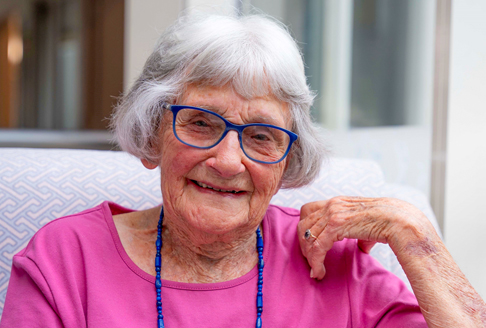
Life is about making connections says Karana’s Jean Giese
Ask 96-year-old Jean Giese what matters in life, and she answers without hesitation. A fairly recent resident of Baptcare’s Karana residential aged care community, Jean has discovered that several staff members grew up in Nepal, so she talks with them about what she saw and learned while trekking in that country.
- 13 Feb 2024
-

Karana’s singing Personal Care Worker is Wan of a kind
Wanderful.Wan in a million.Baptcare’s Karana residential aged care community Wan the lottery when they secured him as an employee.Wan (pronounced like ‘one’) Tanamas is famous at Karana for singing to residents as he undertakes his Personal Care tasks.“I love to sing, and a lot of the residents like being sung to,” Wan said.“I like doing karaoke and even have a karaoke machine at home. I sing a lot of the classics like Sinatra and Louis Armstrong, and it makes people happy.”Wan started life in Jakarta, Indonesia, where he studied law and started a wholesale pharmaceutical company. In 2000 he moved with his children to Australia.“I have two daughters and two grand-daughters. No boys, so I tell them I’m the King in my family!”Singing and caring are inextricably linked in his personal and professional life. Away from Karana, Wan sings in the choir at St Francis’s in the city, where he also volunteers to serve food to people in need.“I like to help people. The residents at Karana are really good. They seem to love me – I must be a sweet talker! But seriously, I know everyone at Karana, every staff member and every resident, and I try to show care for everyone.“I love my job because, if I’m still able, I want to be helping others.”Jared McLeod, Spiritual Care Coordinator at Karana, has seen the difference Wan makes in people’s lives. “Wan is incredibly attentive to residents’ needs,” Jared said.“He is so insightful about how people are going, monitors them closely every day, and sometimes lets me know if he feels people have spiritual care needs we can help with.“He is a super caring man. Just one of the best.”
- 13 Feb 2024
-
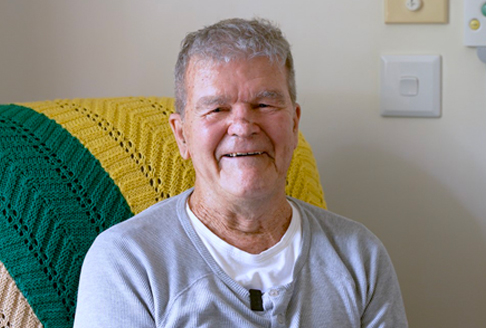
Don McLennan stays healthy in mind, body and spirit at Amberlea
Acknowledging that ageing lifestyles are diverse and that agency and individualised experiences are important is the philosophy that underpins Baptcare’s Living Well Together model of care. It is also exemplified in Don McLennan’s individual and meaningful lifestyle at Amberlea.
- 01 Feb 2024
-
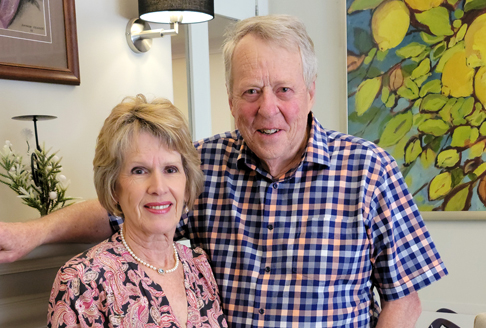
Meet Colleen and Nigel
Meet Colleen and Nigel Linnell, partners in life - and in the workplace - at our Hedley Sutton residential aged care community. Colleen works part-time in reception and Nigel is a volunteer. They are both dedicated to making a positive difference in the lives of our residents, families and staff.Read on to learn more about how Colleen and Nigel came to work and volunteer at Baptcare, and why they love being a part of our Hedley Sutton community.Meet ColleenHow long have you been working at Baptcare? Have you always worked in frontline customer service and administration?I’ve worked at Baptcare for 14 years. I’ve always worked on the front desk in a customer service role.Tell us about a typical day at work – if there is one?Every day is different – I could be dealing with admissions, discharges, meet and greeting, invoices and ordering. It can be very busy – sometimes even a bit frantic! But there’s a rhythm you get used to – it keeps me on my toes.The type of demand we’re seeing for aged care services has changed over time. People are coming into aged care with more complex needs now – perhaps they’ve stayed at home for longer and are only entering care when they can no longer reasonably be looked after at home.We offer respite care at Hedley Sutton now, which was something we didn’t offer when I first started working here. I’m very lucky to be job sharing with Vanessa Hall. I work two days a week and Vanessa works three days. The flexibility is good and works well for us both. We each provide the other with a detailed handover with comprehensive notes at the end of our shifts to make sure that the Hedley front desk operates efficiently.Growing up, what job did you want to do?I’ve been sewing since the age of five – my mother was a dressmaker. I always wanted to do fashion design but in Hobart, where I lived at the time, there weren’t the opportunities to study fashion back then, so I studied shorthand and typing instead and moved into reception/secretarial work. To this day I still take the Minutes of the staff meetings using Pitmans Shorthand.I still sew at home and modify clothes that I buy off the rack. I’m always busy with my sewing machine and have the same Bernina machine that I bought a year after we married!What are some of the most important qualities for someone working as a receptionist in an aged care community?You really need to enjoy the job and be comfortable with the pace – it can get extremely busy at times. Vanessa and I have each other’s backs when the pressure is on. You’ve got to appreciate that the front reception desk works for the nursing staff, Office Manager and residents.Why do you love working at Baptcare?I felt instantly comfortable when I started working here 14 years ago. I love the people and the job – it just feels like family here. The three Directors of Nursing I’ve worked with over my time here at Hedley have been lovely to work for and I get along really well with our Office Manager too. They’ve all been wonderful, confident and competent people to work with.Meet NigelWhat inspired you to become a volunteer at Hedley Sutton?I’d previously volunteered for the RSL and then Colleen nominated me for volunteering at Baptcare.I took over the footy tipping activity from another volunteer who had left the job suddenly with an unexpected illness. It was close to the end of the footy season, and I had to quickly come to terms with another person’s record system that I knew nothing about! But with a bit of hard work and determination, I was able to work through things and finish up that first season.Prior to volunteering, I’d worked in the Finance/Banking industry and finished my career in financial planning, investment portfolios and superannuation. I’m also ex-Army, having completed National Service and served in Vietnam in the late 1960s. I retired at the age of 65 and there was a bit of role reversal at home – I became the domestic manager at home (instead of Colleen) and decided to start volunteering a few days a week.What are some of the volunteer activities you participate in?I run the footy tipping program during the season, volunteering for a couple of days a week, just to catch all the residents and staff who want to participate. It’s a fun topic to talk about with everyone and creates conversation. We have a lovely presentation after the finals – there’s prizes for first, second and third position. Everyone has a lot of fun – and it’s great interaction and conversation for the residents. Most people like talking about footy!What do you think are the most important qualities for a volunteer in aged care?Empathy is important. As a volunteer, you must understand that our residents want to be listened to, recognised and understood. They have amazing back stories to tell about their rich and varied lives. It’s important to take the time to learn more about them. Don’t rush things and don’t be brash – listen to them on their level. Being patient is key – just take the time to sit down and have a chat with them and a cup of tea.What do you do in your spare time?I do quite a bit of home maintenance. We still live in a large home and there is lots to do. I also enjoy going to the gym three days a week. Previously, I was Vice President of the Waverley RSL, and I still have some strong ties there. Colleen and I like to travel a fair bit as well. We’ve been overseas once every two years since 1997, on average. Our last trip was to the UK and Italy. We love to walk everywhere – some days we’d walk up to 15 kilometres. We also like to get away to the Sunshine Coast about 2-3 times a year.Thank you Colleen and Nigel for your dedication to our Hedley Sutton community. We truly appreciate everything you do to make Hedley such a warm and welcoming place for our residents, their families and staff.If you’re interested to know more about working or volunteering at Baptcare, click here for more information on how to join us and share your passion and commitment to supporting people in need.
- 01 Feb 2024
-
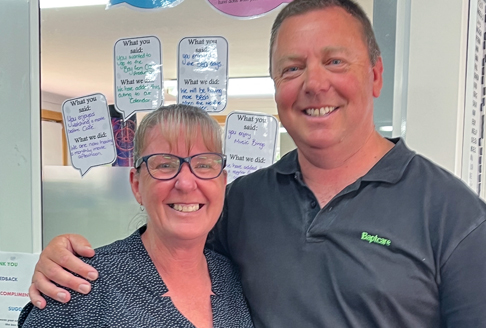
Meet Sharon and Paul Beckett
We sat down with Sharon and Paul Beckett, Care Assistants at Baptcare’s Orana aged care community in Tasmania, to talk about working (and laughing) together as spouses, Orana life and their recent renewal of vows – by an Orana resident, no less! It’s no surprise that they refer to Orana as their second family. But first some words from their manager, Robyn Jones.Robyn, what would you like to say about Sharon and Paul?I have never met a husband and wife who work so well together and can bounce off each other so easily.We say Paul is our MP of Orana. He is funny, always happy and seems to get away with things much easier than any other staff member because the clients love him so much. I regularly receive these types of comments from clients: “Orana would never be the same without Paul”. “The day Paul leaves will be a very sad day for Orana.”But I should note something. You may have heard three of our customers on Paul’s recent video saying that Paul is the best? This was because Paul told them to say this! He is always asking for a show of hands from our clients “Who is the best?” and coaches them to answer, “Paul is the best!”.Sharon is the person who clients can talk to about anything, and she is very trusted. When Sharon says she will follow up something for them they know that she will. Sharon has taken clients on bus trips over the years, and the clients always comment that they were in great hands with her. Sharon takes her responsibilities in ensuring client safety very seriously.Sharon and Paul have taken clients on weekends away twice and they are asking for another weekend away to the East Coast. This is very important to our clients as they can’t go away on weekends on their own, so it’s very special for them that Orana can provide this opportunity.And now, let’s hear from Sharon and Paul.What are your roles and how long have you been working at Baptcare? Paul: I have been with Baptcare for approximately six years. I work in the activities centre five days a week. I assist in serving meals and make sure all the customers are engaged in the afternoon activities. I also facilitate the overnight trips. I make sure that the customers leave feeling better than they did when they arrive.Sharon: I have been with Baptcare for six and a half years. I started in the Overnight Respite before moving into the activity coordinator role, then out to the community where I provided support for Domestic Assistance (DA), Personal Care (PC) and Social Support Individual (SSI). I have also worked side by side with Paul in the Social Centre. I’ve been in my current role of Intake and Assessment coordinator for approximately 18 months and I love it! What do you like about working at Baptcare Orana?Paul: I enjoy interacting with customers and bantering with them. They never know what they are going to get from day to day. I also like being able to work in the same facility as Sharon.Sharon: I enjoy working at Orana as I get to get up every morning knowing that I get to walk through the door and start my day in a job I love. I also love working under the same roof as Paul.What are three words that best describe you?Paul: Funny, outgoing, entertaining.Sharon: Caring, honest, hardworking. What did you want to be when growing up? Paul: PolicemanSharon: Hairdresser Pet Peeve?Paul: Being interrupted mid conversation.Sharon: When people are late and don’t apologise. First Job? Paul: Carpet factory worker.Sharon: Supermarket cashier.Ideal holiday destination: Paul and Sharon: Alaska! Fun fact many people may not know about you? Paul: I’ve been a covert surveillance investigator for over 7 years. (Editor: such a perfect example of Paul’s sense of humour at work! Thanks Paul!).Sharon: I studied classical ballet as a child/teenager and received many high distinctions.We heard that you had your wedding vows renewed to celebrate your 30-year anniversary and that a client, Ted Nobbs, ran the service? (Photo below to be included) We renewed our vows on our 30th wedding anniversary in 2022. Ted is a special customer at Orana and the day wouldn’t have been the same without him. We were also lucky to have our two adult children and Paul’s mum and stepfather there with us. Ted was a minister in his younger years. He very kindly wrote our vows, said a few words and presented us with a lovely certificate.Have you got any tips for a successful marriage?Paul: Apologise every morning before doing anything.Sharon: Always talk about things no matter how small or big they are.We don’t want to rock the happy relationship boat but who are your celebrity crushes?Paul: Keira Knightley.Sharon: Hugh Jackman (And he’s now single! )Favourite Quote?Paul: People say exercise never hurt anyone but why risk it?Sharon: Be yourself, everyone else is taken. What are the best and worst things about working together as husband and wife at Baptcare?Paul and Sharon: best thing: we are always together being able to support and bounce off each other in the workplace.Sharon: worst thing: I don't think there is one. We have worked together in other jobs throughout our working life and I just enjoy having Paul by my side.Paul: worst thing: Customers always take Sharon's side during banter and never mine.Thank you, Paul and Sharon, for your fun and caring hearts. We appreciate all that you do daily to make Orana such a special place to be.
- 16 Jan 2024
-
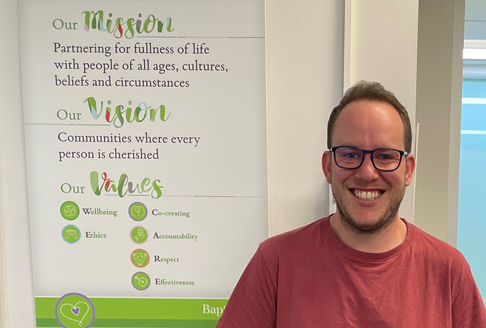
Meet Martin Dicker
We sat down to chat with Martin Dicker about his work at Baptcare in Tasmania, including his unofficial position as office comedian and social club organiser extraordinaire!What is your current role and what does it involve day to day? I am a Family Services Practitioner in the Foster and Kinship Care Program in Tasmania. This role sees me travelling all around the north of the state, providing support to carers of children in out of home care.How long have you been working within the Family Services team at Baptcare and what drew you to working in this space? I have been in the Family Services team for just over a year. I used to work in the Horizons program in the Mindset team. I have always loved the culture of Baptcare, so I was drawn back after a while out of the organisation. I love working with families. It can be a complex space to work in at times, but it can also be highly rewarding. What do you like about working with Baptcare and in the family services space? I really love our team and the culture and the growth you can see in families we work with. It’s amazing to see the changes a family can make to help it function better, meet the needs of the children or the parents/carers.Can you share a particularly special work day you’ve had recently? A particularly special day I had with a family recently was when a young person in care was elected to their school’s Student Leader Board for 2024. The happiness, excitement and pride they had made me shed a tear of joy! Did you always want to work within the family services space and what are some other jobs you’ve performed in your career? I have worked in a number of different areas since graduating as a social worker, including mental health, housing and family services. I have found there is so much you can learn from every area you work in that can be transferred into work in other spaces. What did you want to be when you grew up? I wanted to be a firefighter and a pilot!You’ve got a reputation as being the office comedian! What or who makes you laugh? Haha… Lots of things make me laugh. When working with such complex situations, you learn to find the silver-lining. I really love sitting down and consuming a wide range of stand-up comedy, TV shows and podcasts. Some of my favourites include comedians Geraldine Hickey, Rhys Nicholson and Jimmy Carr, TV shows Utopia, Schitt’s Creek and Archer, and podcasts No Such Thing as a Fish and Simply the Jest. You’ve also got a great wrap for being active in the social club. What made you get involved? I love getting involved building the culture in organisations I work for. The Social Club in the Mowbray Hub holds a special place in my heart. We’ve had a lot of success hosting lunches, arranging Christmas parties and activities such as corn-hole (an indoor game) and drumming. Can you tell us two surprising things about yourself? I am a bird nerd and I love mountain-bike riding.Please complete this question: my favourite weekend would include… Time outside, on the couch and at Bunnings. What are two things on your bucket list? Bungee jumping and flying a plane.Do you have a mentor or idol? I don’t really have a specific person. I just enjoy talking with people and hearing about their lives. I find that everyone I meet has something interesting that I can learn from and connect with.
- 12 Jan 2024
-

Caring for yourself during the holiday season
The Christmas and New Year holiday season is a time of joy and celebration, but it can also be stressful and overwhelming. It’s important to take care of yourself during this time to ensure that you can enjoy all the fun on offer without feeling burnt out. Here are some handy tips on how to care for yourself at Christmas:Set boundaries: It’s important to know your limits and to communicate these to others. Don’t feel pressured to attend every event or to take on more than you can handle. Learn to say ‘No thank you’ when you need to.Take breaks: Make sure to take some time for yourself. That might be a quiet walk outside, a relaxing bath or a good book. The key is to find something that helps you unwind and recharge.Get enough sleep: A good sleep routine is essential for your physical and mental wellbeing. Try to maintain a regular sleep schedule and aim for at least seven hours of sleep each night.Stay active: Exercise is a great way to reduce stress and boost your mood. Even a short walk around the block can make a big difference. Remember to ‘slip on a shirt, slop on sunscreen and slap on a hat’ to protect yourself from the sun while out and about.Eat well: The Christmas/New Year period is full of tempting treats but it’s important to maintain a balanced diet. Try to eat plenty of fruit and vegetables and limit your intake of sugar and alcohol.Connect with others: Spending time with loved ones can be a source of great comfort and joy during this time of year. Reach out to friends and family and don’t be afraid to ask for help if you need it. Volunteering can also be a wonderful way to boost your mood and spread some holiday cheer.Practice gratitude: Take some time each day to reflect on the things you are grateful for. This can help you stay positive and focused on the good things in your life, instead of worrying about what’s missing.Take care of your mental health: The holiday season can be a challenging time for anyone struggling with mental health issues. Make sure to prioritise your mental wellbeing by seeking support from your GP, therapist or counsellor if needed. You can also connect with support services such as Beyond Blue, SANE Australia or Lifeline.Remember, the holiday season is about more than just gifts and parties. While it’s a great time to connect with others and reflect on the past year, it’s also an important time to take care of yourself.
- 28 Dec 2023
-
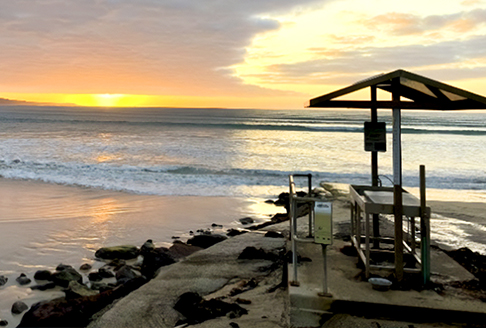
Blue Christmas reflection by Acting Head of Spiritual Care, James Lewis
In December 2013, our family packed into the car and drove the caravan across the Nullarbor for a long awaited Long Service Leave holiday. We planned to meet my sister and her family who live in Perth. Mum and Dad and my brother would fly over and join us for a wonderful Christmas gathering. But in July, Mum was diagnosed with a brain tumour. She died two months later. So the LSL changed from an exciting new adventure to a road trip with grief. Christmas was going to be different.In Perth, we gathered with hearts full of love and eyes full of tears. Our dear Mum who had always been our dynamic social engineer was absent. But she was still powering us together! It was so sad, and yet so important to share together. We honoured our love for her in her absence, and in turn she made her ‘presence’ amongst us.With Christmas upon us it is good to acknowledge that this can be a very difficult time for some people. Not everyone looks forward to Christmas: it is a season loaded with all kinds of baggage. It arrives with dreams of holiday excitement, end-of-year relief, family gatherings and parties. For many people it reminds us of those who we most dearly miss; a unique grief and sorrow. We may wish our Mum was still alive to share the time, or a child, or a partner. Equally we may wish to avoid having to spend time with difficult family members or carry the burden of expectations to spend money we don’t have on gifts. Christmas, tragically, is the worst time for domestic violence, homelessness and alcohol abuse.In the northern hemisphere there is a tradition called ‘Blue Christmas’, held on 21 December, their Winter Solstice and longest night. Christian churches hold a service that makes space to honour people who have lost loved ones. The service includes expressions of grief and pain, as well as the opportunity to focus on the promise of hope found in Christ.Acknowledging fragility in this season is important for addressing feelings of shame and isolation. It is helpful to talk about the tension between our hopes and ideals for Christmas – and the reality. A ‘Blue Christmas’ is one way of acknowledging our fragility in the face of difficult times. Sharing fragility builds a sense of common humanity – the gift of community, understanding and hope. Sometimes the heaviest burdens we carry are not imposed by others but by our own unrealistic expectations of ourselves.This Christmas I hope you connect with trustworthy people who are safe, who nourish your life and soul with love, and who remind you of the beauty that emerges in vulnerability. May you have the courage to name what you need to care for yourself and your loved ones.May you find solace and strength in places of beauty, in rituals and spiritual practices that bless your soul and spirit. May you find hope, peace and glimpses of goodness in the aspects of Christmas that feel safe and life-giving.I believe God’s gift in Christmas is the promise of ‘Emmanuel’: God with us in our everyday journey. May there be a sense of the sacredness of companionship in your journey.James LewisActing Head of Spiritual Care.
- 13 Dec 2023
-
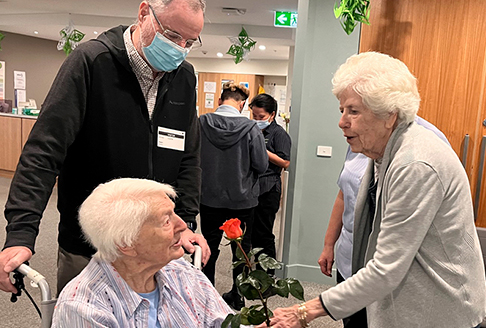
Living Well Together launched at Strathalan Residential Aged Care Community
Living Well Together, our new model of care, has been officially launched at Baptcare’s Strathalan Residential Aged Care community.The launch was a wonderful event, with residents and family members given the opportunity to hear from and meet with Baptcare CEO Geraldine Lannon, Chief Operating Officer Silvia Alberti, Baptcare executive leadership team members and Associate Professor Darshini Ayton from Monash University’s Health and Social Care Unit.Living Well Together (LWT) is also implemented at Brookview community and will be rolled out across all of Baptcare’s residential aged care communities.This approach has been created in consultation with residents, families and Monash University researchers to better meet the needs of all residents who we care for, including those living with cognitive impairment or dementia.At the Strathalan launch the meeting area was festooned with green and white decorations, balloons and posters. All decorations were made by residents, with assistance from staff, exemplifying what LWT, Montessori and person-centred care is all about.Deepti Kaushal, Strathalan’s Residential Care & Services Manager, said the launch was a great event for the whole Strathalan community. “It was spectacular! Residents had a lot of input in decorating the area, and we received a lot of positive feedback from the residents and their families about how LWT has changed their lifestyle and is providing them with an opportunity to do what they were not able to do before.“LWT is about meaningful activities, not just playing games in groups. It’s more personalised and person-centred. We are giving staff more training and education to understand the importance of having engagement with residents rather than just focusing on their task list.“It’s about getting to know the residents more deeply. Staff are receiving training to create genuine opportunities for residents to be involved in more meaningful activities they love to do.”In aged care, models of care define care practices. They guide how aged care services should be delivered, and outline best practice so that residents get the right care at the right time.LWT focuses on what matters to residents, what is important to them, and what gives them meaning and purpose. It also supports staff by defining the tools, resourcing and training they need to best care for all residents.
- 07 Dec 2023
